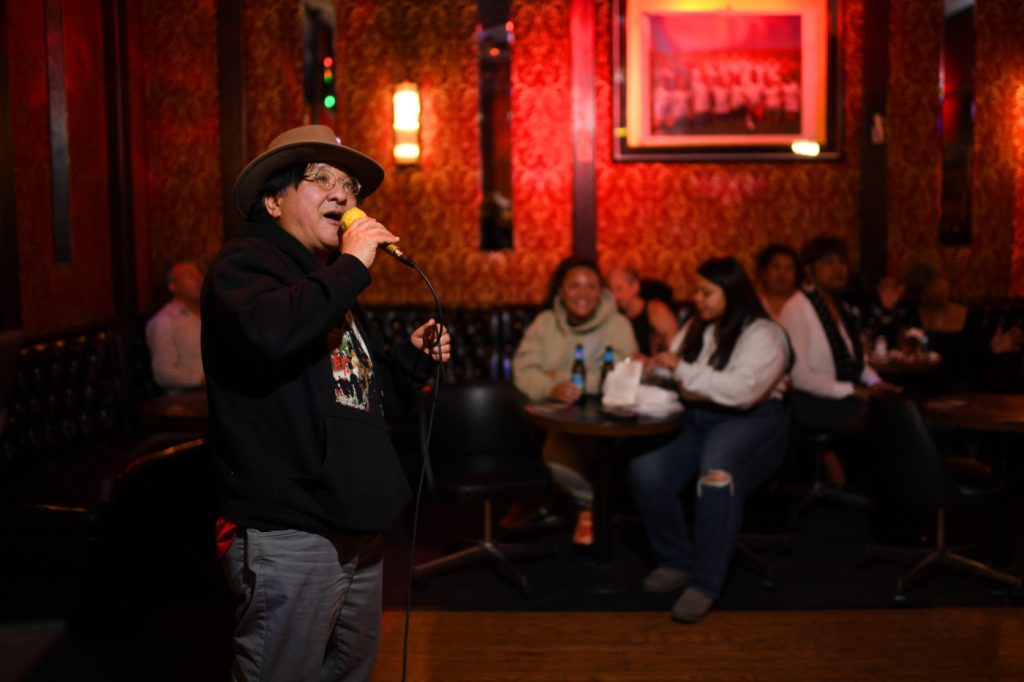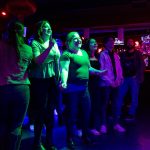When Caitlin Bethune-Daniels met Chris Daniels on the dating app Coffee Meets Bagel, one of the ice-breaker facts she provided was that she’d won $500 in a karaoke competition singing Leona Lewis’ “Bleeding Love.”
“He saw my profile and said, ‘I could marry this woman’ out loud,” recalls Bethune-Daniels, a school teacher in Union City.
What followed was a karaoke courtship in which Bethune-Daniels tested Chris to see if he was suitable enough to visit her favorite haunt, 7 Bamboo Lounge in San Jose.
“When we first started dating, we went to the Red Stag (for karaoke), because I wasn’t quite sure if it was serious,” she says. “And you don’t bring someone to your karaoke bar until you know it’s for real.”
But it did get serious, and the two got married last year – another success story chalked up to karaoke. Today, you’ll find them singing classic R&B and power ballads at 7 Bamboo, one of the oldest karaoke lounges in the Bay Area. Their voices join in an ocean of crooning, wailing and belting that swells nightly from dance floors in places like the old-school Mel-O-Dee Cocktails in El Cerrito, Effie’s in Campbell, the Mint in San Francisco and dozens of celebrated others.
Some people might wave off karaoke as a silly hobby, something to liven up boozy birthday parties and lame company events. They couldn’t be more wrong.
“Karaoke brings people together in one forum where we all can just enjoy ourselves in this moment of music and laughter and happiness,” says Keefer Harness, a financial-services agent from Sacramento who sings at Mel-O-Dee. “That’s why it’s such a great phenomenon and art form. What else is more fun than going out, having a cocktail and listening to people singing? It’s the American way.”
Gabriel Horn, right, from San Jose, sings “Heroes” with Matt Whelan, from San Jose, during Blue Monday Karaoke at the Caravan Lounge in downtown San Jose, Calif., on Monday, March 18, 2024. (Nhat V. Meyer/Bay Area News Group)
Karaoke around here has launched careers. William Hung began his climb to “American Idol” fame as a civil-engineering student at UC Berkeley who loved singing karaoke – disastrously, but with bulletproof confidence. In 2004, he mangled Ricky Martin’s “She Bangs” in front of a stadium of Golden State Warriors fans, wowing two of Chris Farley’s brothers in attendance. “She may bang,” they deemed, “but William rocked.”
Dedrick Weathersby is a Broadway star who has performed in “Dreamgirls” in San Francisco and recently toured the country with his own one-man show about James Brown. He’s now written another Broadway production about Little Richard, “Tutti Frutti,” premiering this winter in Dallas, and credits his success to singing at Mel-O-Dee Cocktails.
Weathersby would come in wearing a stylish wig and practice “I Feel Good” and “It’s A Man’s Man’s Man’s World” while drinking his favorite drink, water with no ice. “I was like, ‘Wow, they really like this… I actually can build a show around it!’” he says. “It was the welcoming experience of the Mel-O-Dee staff, the ownership and also the patrons that sparked the show that ended up with me being on a national tour.”
Having sung all over the country, Weathersby believes the karaoke crowd in the Bay is different. “It is more than just fun in the Bay Area. It’s people that probably did not get a shot or did get a shot but something happened in life, and it’s literally like a talent show.”
Karaoke is universal among race, gender and socioeconomic boundaries. Celebrities seem to enjoy it, too: Joseph Gordon-Levitt and Jimmy Fallon did a “Late Night” showdown as David Bowie and Axl Rose where Gordon-Levitt parodied Axl weirdly singing Kelly Clarkson’s “Since U Been Gone.” Sir Paul McCartney participated in “Carpool Karaoke,” making James Corden shed tears with his rendition of “Let It Be.” Jewel visited a local bar for an “Undercover Karaoke” sketch with Funny or Die while wearing a giant prosthetic nose and singing her own music with passion. “You could be an ugly girl with a voice like that,” a female listener told her, “and you’d get laid all the time.”
Victor Jang, left, from San Jose, shares a laugh with Josh Corrado during Blue Monday Karaoke at the Caravan Lounge in downtown San Jose, Calif., on Monday, March 18, 2024. (Nhat V. Meyer/Bay Area News Group)
The celebrity sightings around here are a little more mundane, but nonetheless notable.
“When I was up at the Mint one night, the (California) state treasurer Fiona Ma was there with friends and singing,” says Che Angkham, a San Jose karaoke singer. “She was just hanging out and wearing some costume. I was like, ‘Oh yeah, I guess I’m just here at the karaoke bar with state treasurer Fiona Ma.’”
“Pepa from Salt-n-Pepa came in one time after she had a concert at the SAP Center,” says Keith Geddes, aka “KG Kage,” a karaoke jockey who’s worked for a decade behind the booth at 7 Bamboo. “She sang Bon Jovi’s ‘Wanted Dead or Alive,’ and after that, the bartender and I were, like, ‘Can you sing one of your songs?’ She sang ‘Push It,’ and that was awesome.”
Karaoke singers take the stage at the 7 Bamboo Lounge in San Jose, Calif., Friday, March 15, 2024. (Karl Mondon/Bay Area News Group)
7 Bamboo has attracted the likes of California Democratic Rep. Mike Honda, who reportedly brought his own CDs and performed slow ’60s and ’70s songs, and San Francisco 49ers players, decompressing after Sunday home games. Most often in these joints, though, you’ll find a diverse mix of ordinary folks: theater workers, part-time musicians, designers, maybe a retired heart surgeon or Golden Gate Fields horse trainer and public-school teachers – so many teachers.
“It’s funny, we get teachers from all around. It’s at the beginning of the sessions when school starts, when all these teachers come and get their karaoke in and do what they do,” says Pinole resident Delia Cavizo, a karaoke jockey for 15 years at Mel-O-Dee.
“I used to refer to it as ‘theraoake,’ because it was a good destresser,” says Bethune-Daniels, who last year taught a class of kids who grew up during online-pandemic education. “They really didn’t do kindergarten in a real way, and it was just a little chaotic…. Karaoke was a good way to break up the week and let off some steam and not have to think about what I was going back to in my classroom the next day.”
“I would see her get up on stage,” says husband Chris Daniels, “and all of the stress and all of the pain she’d been carrying from that day would melt off her face, and she would shine. And in that moment, she was fully herself.”
Karaoke jockey Keith Geddes keeps the party going at 7 Bamboo Lounge in San Jose, Calif., Friday, March 15, 2024. (Karl Mondon/Bay Area News Group)
The therapy aspect of karaoke is real. “Around 2012, I was not in a good place in life, I was dealing with personal emotional issues and work issues, loneliness and depression and those kinds of things,” says Eckoes, a pseudonymous karaoke jockey who lives in Modesto.
“I wouldn’t necessarily say it’s a double life, but for me, it lets me disassociate,” he says. “And without it, I definitely wouldn’t have as deep of a social network as I do now, because of those relationships I made during karaoke.”
At 7 Bamboo, a group of regulars formed a friend group called “The Boo Crew.” “I think you can question the healthy life balance of this, but sometimes we would have what we call ‘perfect weeks,’ which is when we went to karaoke every night,” says Angkham.
“Outside karaoke, we actually did a couple trips,” says Bethune-Daniels. “One time we went to Tahoe for New Year’s Eve, got a big Airbnb and a whole bunch of us came. Another year we did a trip to Vegas where one girl was getting married, another was turning 30 and another 31, so we were finding any excuse to celebrate and making the trip all about that.”
So how do people pick their songs? Well, it turns out there can be complex motivations.
“It’s funny – what I’ve done before is get to the karaoke bar early, and I’ll choose Radiohead’s ‘Creep’ right away, because I know everyone else wants to sing it. And I know if I sing it, no one else can do it for a while,” says Chris Daniels.
“I was a pretty quiet kid when I was younger, and I think music and performing was one of my ways of building up confidence,” says Drew Jones, an account manager and musician who lives in Martinez and who performs at Cato’s Ale House in Oakland.
“I like to sing songs that people know – Goo Goo Dolls, blink-182, The Killers and stuff like that, because I like to feel the energy in the room,” Jones says. “When it’s a good crowd, you receive some energy and give some energy back…. It just creates a really cool ball of momentum, a nice ball of energy you get rolling through the course of the night.”
Wink McDaniel, of Albany, sings karaoke at Mel-O-Dee Cocktails in El Cerrito, Calif., on Thursday, March 14, 2024. (Jose Carlos Fajardo/Bay Area News Group)
Gary Miyamori is known in karaoke circles as “One and Done,” because he comes into bars to sing one song that knocks people off their feet and then departs. “I don’t bring a list of songs. I just wave to (the karaoke jockey) that I’m here, and she picks one,” says Miyamori, who works in I.T. and lives in El Cerrito.
Related Articles
Review: Legendary punk acts gather in a parking lot to rock with fans
San Jose tenor Pasquale Esposito: On Puccini, Freddie Mercury and singing the songs that make audiences melt
20 Essential Bay Area vocal albums: From Johnny Mathis to Jello Biafra
A chat with Dave Prinz of Amoeba Music, the world-famous indie-record store
Britney Spears calls sister Jamie Lynn a ‘little b—h’ in now-deleted video
Miyamori has been singing since the ’80s, back when San Francisco’s Pier 39 had a place called Music Tracks where you could broadcast your warblings to tourists outside and also record it on a cassette tape. “I bought a machine, took lessons for about eight months and had a vocal coach,” he says. “I’m also a fifth-degree black belt in karate. If I’m going to do something, I’m going to go all the way.”
A lot of the older karaoke singers around the Bay have disappeared, says Miyamori. “There is a new breed of karaoke singers that have emerged. I noticed them a little before the pandemic. I don’t know what drives them,” he says. “Vocally, in my opinion, they are not as good. You can always tell an old-school karaokist, even if you have never seen them or heard them before. Generally, they have their songs down pat, and the songs they sing are quite polished.
“Just the other day, I heard some woman singing a Patsy Cline song called ‘Sweet Dreams,’” he continues. “I said, ‘Who is that?’ I ran to the back of the bar to see who it was. It was an elderly woman who just started coming to the Mel-O-Dee, a little while ago. The whole bar stood up to see who was singing. It was so good, it sent shivers down everyone’s spine. That doesn’t happen too often.”
Stephanie Whigham sings “Sweet Caroline” while running Blue Monday Karaoke at the Caravan Lounge in downtown San Jose, Calif., on Monday, March 18, 2024. (Nhat V. Meyer/Bay Area News Group)
Most of the time, the choice of the song doesn’t matter – what matters is that the singer commits fully to the energy of the room.
“If there’s a pie chart of what I like about karaoke, right, there’s a wedge that’s your turn to sing, which is really fun,” says Stephanie Whigham, who hosts karaoke nights at San Jose’s Caravan Lounge. “Then there’s a wedge that’s listening to your friends sing. But the bulk of the pie is that it’s socially acceptable to sing along with nearly everything in this community energy of shared music.”
That’s true even if you can’t hold a tune to save your life.
“Even if you can’t sing at all,” says Whigham, “and you put on ‘Tequila’ at the right time of night and sing those three words, people love it – it’s great.”


